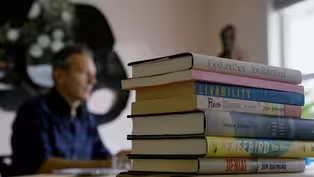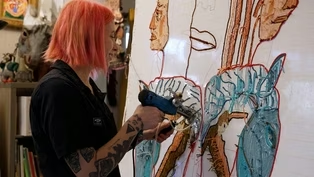Oregon Art Beat
Vietnamese American pastry chef highlights community and culture through cakes that combine Asian and Western flavors.
Clip: Season 27 Episode 1 | 7m 9sVideo has Closed Captions
Vietnamese American baker, Helen Hồng Nguyễn, bakes artistic cakes reflecting her heritage.
Vietnamese American pastry chef Helen Hồng Nguyễn combines ingredients that reflect her Asian identity with Western flavors to create a wholly new dessert experience. Known online as "The Cake Batch," she uses her decorating classes as a way to highlight issues important to the AAPI community and in her words "give back to the community that has given her so much".
Problems playing video? | Closed Captioning Feedback
Problems playing video? | Closed Captioning Feedback
Oregon Art Beat is a local public television program presented by OPB
Oregon Art Beat
Vietnamese American pastry chef highlights community and culture through cakes that combine Asian and Western flavors.
Clip: Season 27 Episode 1 | 7m 9sVideo has Closed Captions
Vietnamese American pastry chef Helen Hồng Nguyễn combines ingredients that reflect her Asian identity with Western flavors to create a wholly new dessert experience. Known online as "The Cake Batch," she uses her decorating classes as a way to highlight issues important to the AAPI community and in her words "give back to the community that has given her so much".
Problems playing video? | Closed Captioning Feedback
How to Watch Oregon Art Beat
Oregon Art Beat is available to stream on pbs.org and the free PBS App, available on iPhone, Apple TV, Android TV, Android smartphones, Amazon Fire TV, Amazon Fire Tablet, Roku, Samsung Smart TV, and Vizio.
Providing Support for PBS.org
Learn Moreabout PBS online sponsorship(playful music) - Food to me is just a basic necessity, but it also means a huge deal of creativity.
It means togetherness.
It means an abundance of love and unspoken language that you can't verbally say with your mouth.
Ooh, that was legit.
I'm just saying (laughs).
My earliest memory of baking was actually when my father went to prison and I saw how long of hours my mom was working.
She probably put in 14 hours a day owning a nail salon, and so I really wanted to give back to her.
And the only way I knew how to was utilizing the ingredients that we had at home.
So, I started to make chocolate chip cookies for her.
I started to make truffles for her.
Food is so complex to me, because of the food insecurity that I had as a child, like going to sleep hungry at night and knowing that perhaps I would eat at school but maybe not at home.
That was just really difficult for me to comprehend as a kid.
I think that that's something that every child should never experience, right?
I was getting older.
I started thinking about, like, what I really wanted to do as a career, and I always loved math and I always loved art.
And so I really went back and forth between being an architect or a baker or a cake decorator.
And so when looking at Food Network and seeing all of these beautiful sculptures of cakes and cookies and chocolate, I was like, "Well, that's kind of like architecture."
I started to really push myself to be more in the artist field.
(lively music) I think whenever there is food involved and people, there's always a good time, and I think that's really when I connected the two of what food can do for people and what community can do with food.
I started The Cake Batch in 2023, I believe.
I wanted to really make sure that it stood out and represented me, something catchy, something sweet.
I actually have tattooed on me, "Talk sweet to me."
It was always something that I went back and forth about because I think when you're thinking about just Asians in the culinary world, I think we have imposter syndrome.
It's like, how is this going to be profitable?
But then also something that my parents are going to be proud of.
What The Cake Batch means for me is leaving behind a legacy that not only represents Asian Americans and the flavors that I grew up knowing and loving, but then opportunities for other kids to see that it is a possibility.
Whatever your background is, you can find a home in cakes.
When I think about combining Asian flavors with Western techniques, I love to compile all the different types of flavors that I had growing up.
Soursop, tamarind.
Wow somebody with the flavor compositions that I do have.
When they come to a pop-up and they see my ube velvet cake and they're like, "That's really unique."
- Hi!
- Gorgeous.
- Thank you.
- What is that?
- So that is my rendition of a red velvet cake, but instead it's an ube velvet cake with a blueberry compote cream cheese whipped cream on top.
- Oh my god, are you serious?
- Yeah.
- Fabulous.
- Thank you.
So I really just like to play with colors and flavors at the same time.
And what would really compliment the ube?
Something tart or sweet versus what is typical, which is just a red velvet with the cream cheese.
When we think about the American dream and what our parents want to leave behind is something unfathomable outside of what they could ever imagine, that is possible for them, giving me opportunity to pursue something so much more, to give back to community and represent what Asian fusion pastries can look like in America.
Hello, beautiful people.
Hi.
Thank you so much for joining me today for our decorating class.
I really want to give a huge shout-out to Holla for inviting me today.
I know that this is really special for the mentors and mentees to come together and create something really special tonight.
Typically, during these cake decorating classes, I actually really like to tap into topics that are taboo within the Asian community.
For instance, when I speak about my family, I try not to shy away from it.
I really like to talk about mental health and wellness.
Holla is a nonprofit that helps underprivileged youths have different opportunities in STEM, and the theme of that class was growth and how, whether your circumstances are against you in life, it doesn't predetermine where you're going to end up.
If you guys notice, I'm wearing this dress.
It's called an ao dai.
It's a traditional Vietnamese dress.
I love representation and I'm never shy to tell people where I'm from, who my people are, where my parents come from in their journey.
So my mom and dad actually were refugees from the Vietnam War.
When they came to America, I was the very first born.
So Helen obviously is not a Vietnamese name, but my Vietnamese name is Hong.
So Helen means "light" and Hong means "rose."
So my full name is "Light on the Rose," and I really thank my mom for that.
There's no wrong way to do or go about life, and as long as you're not hurting anyone, as long as you are serving and trying to give back in a positive light, then to pursue it.
And I think what I'm doing is honestly extremely fulfilling.
If you want to dream, dream big and do all that you can to really not only make your parents proud, but yourself proud.
Yeah.
(uplifting music) (upbeat music) (upbeat music continues) (upbeat music continues) (upbeat music continues)
Author and Screenwriter Jon Raymond
Video has Closed Captions
Clip: S27 Ep1 | 9m 36s | Novelist and screenwriter, Jonathan Raymond, is known for grounded stories of everyday life. (9m 36s)
Video has Closed Captions
Clip: S27 Ep1 | 9m 18s | An edgy tufting artist wants to make you laugh and cry. (9m 18s)
Providing Support for PBS.org
Learn Moreabout PBS online sponsorshipSupport for PBS provided by:
Oregon Art Beat is a local public television program presented by OPB
















